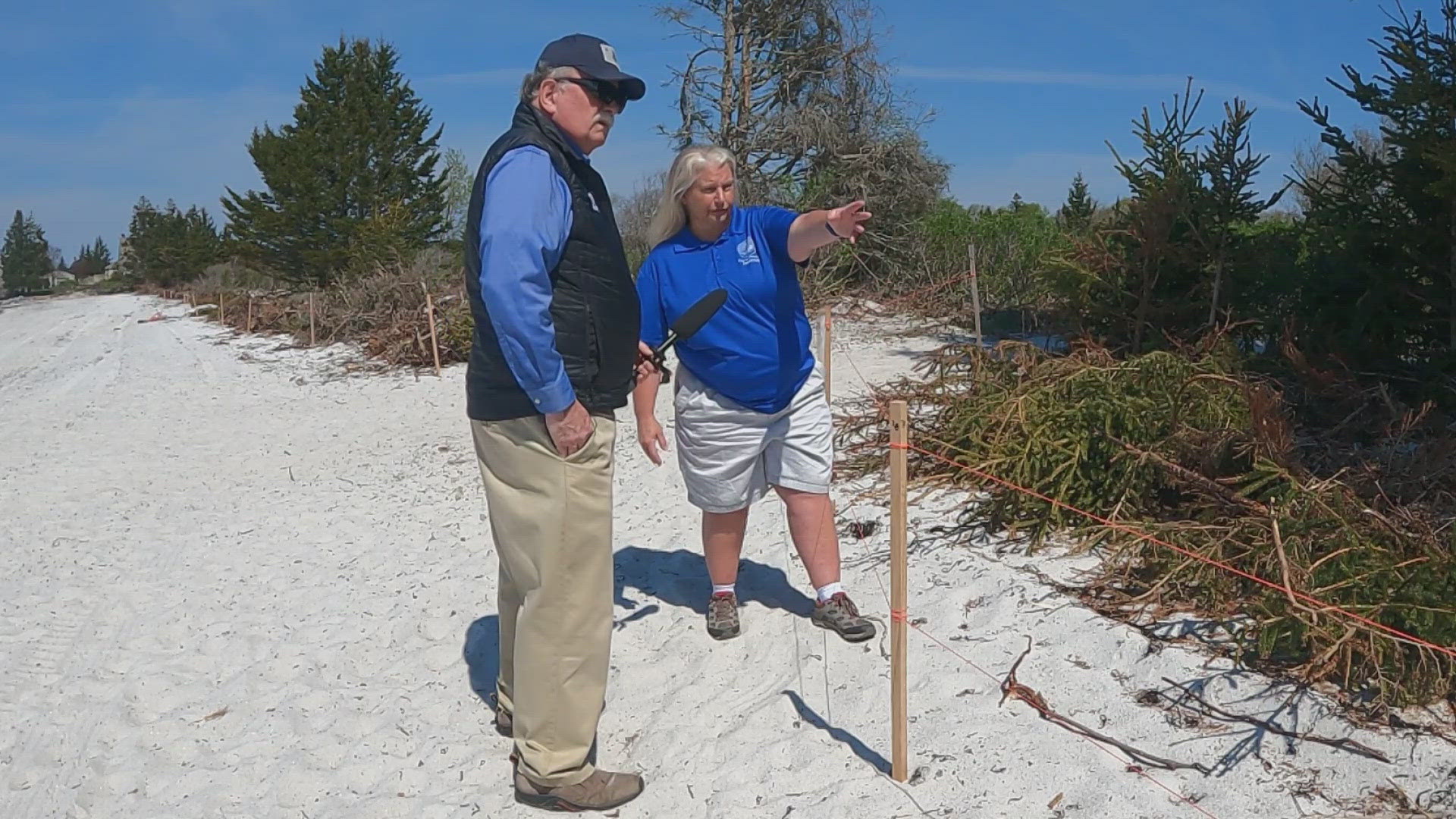BRISTOL, Maine — Summer is coming, meaning crowds of visitors will soon be taking in the spectacular view at Pemaquid Point, or relaxing on the pristine, white sands of Pemaquid Beach.
It also means more lobstermen setting out traps, and pogey fishermen hoping to land scores of barrels of baitfish at the New Harbor Co-Op's dock.
Four and a half months ago it looked like those things might not happen after ferocious back-to-back ocean storms devastated the coast of Maine.
Bristol was hit hard.
At Pemaquid Point, the 128-year-old brick bell house was blasted apart by waves, leaving only two walls standing. The old keeper’s house, now a fishermen’s museum, had one wall bashed in by storm-tossed debris. That wall and most other damage have been repaired now, and in June, a brick mason will begin rebuilding the bell house.
"I think the only thing that held this building was the tower, this building is bolted to the tower," Bristol Parks Commission member Clyde Pendleton said as he looked at the cribwork of heavy wooden beams now supporting the building’s roof.
The work comes with a big price tag, but Pendleton said there was never a question about rebuilding.
"It's something we said from the beginning, we have to bring it back to its original state. So when people come they won’t know there has been a disaster here," Pendleton said.
Pemaquid Beach, also managed by the town’s parks and recreation department, was covered with broken trees and driftwood after the January storms. Worst of all, the waves and high storm surge washed away the sand dunes that are essential for the beach. A team of park staff and volunteers took all that wood and used it to lay out a foundation for new dunes, Bristol Parks and Recreation Director Shelley Gallagher said.
"See we have trees and branches aiming [facing] into the wind, so that when the sand blows in here the trees will trap the sand so it will rebuild the dunes," Gallagher explained.
Gallagher said a similar dune restoration effort had worked at Popham Beach and had been started at Pemaquid after a storm two years ago. She’s confident it will work, though Pendleton predicted it could take as long as 20 years to restore the dunes to the size they were before the twin January storms.
And while the damage at the beach and the point was upsetting to many local residents, the most serious damage in Bristol was to the working waterfront in New Harbor. There, the high seas and the tidal surge ripped fishing docks apart, washing some away completely and leaving others essentially unusable.
That’s what happened at the New Harbor Co-Op, where the large dock supports more than two dozen fishermen.
Co-op leaders made the costly decision to rebuild immediately, with no knowledge of whether state or federal disaster relief would be available.
Now, the main dock has been replaced and is just waiting for the electrical hookup to the small hoist that brings the heavy crates of lobsters from the boats up the 15 or more feet to the dock level.
"It's much better [now]," co-op manager Linda Vannah said. "You can drive on it. Five months ago you couldn’t drive on it, couldn’t take lobsters off the dock."
The co-op made a strategic decision to raise the height of the dock as much as 18 inches, hoping to be safe from future storm surges, driven by stronger storms and rising ocean levels predicted as a result of climate change.
Co-op president Mike Pryor showed how in rebuilding the dock, extra precautions were taken by chaining it down to the ledge underneath so it can’t be lifted up by extreme tides.
That all comes at a cost. It was $320,000 for the new main dock, Pryor said. But there are two other sections demolished and waiting to be rebuilt, plus another dock further up the harbor.
"That’s another hundred thousand dollars," Pryor said, pointing to a section beside the new dock. Then he gestured to the empty space on the opposite side.
"And this piece here is probably another $75 [thousand]. And we aren’t even talking about the next dock up, those materials cost around $200,000, something like that."
Vannah said the co-op so far had paid for all the work out of its own pocket, using the full amount of its line of credit. Like businesses and fishermen up and down the coast, they’re hoping for assistance from FEMA and the state's disaster relief fund, recently approved by the Maine Legislature.
A large portion of the approved $60 million will be directed toward working waterfront repairs. More details can be found here. The application process has recently started and is being managed by the Maine Department of Transportation.
FEMA also issued its latest update for Maine on Wednesday, stating:
"While the disaster recovery centers are no longer open, applicants can reach FEMA by calling toll-free 800-621-3362 or going online to DisasterAssistance.gov. The phone line is open daily from 7 a.m. to 1 a.m. ET, (press 3 for an interpreter who speaks your language). If you need assistance with your online account, please call 800-745-0243."

